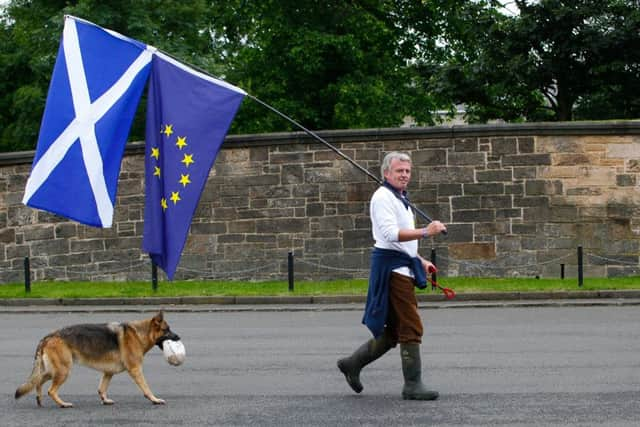Could Scotland legally remain a member of the EU, post-Brexit?


A majority of voters across the UK wanted out of the EU. But in two nations - Scotland and Northern Ireland - a majority backed continued membership.
What happens next could be a defining chapter in the history of devolved administrations, such as Holyrood, and their relationships with central government.
Advertisement
Hide AdAdvertisement
Hide AdCould Scotland somehow find a way of remaining an EU member, while also retaining its place in the UK?


Unchartered territory
Nicola Sturgeon has emphasised the Scottish Government will explore all options to ensure Scots can retain their EU citizenship.
But the First Minister has admitted there is no real precedent for Scotland to remain if the rest of the UK leaves.
“The territory is uncharted, the page is blank,” she said in a speech last week. “That gives us an opportunity to be innovative and creative - an opportunity to shape the future.


“For our part, the Scottish Government has already started work - advised by our standing council of experts that I appointed in the days following the referendum - to develop such options.”
Professor Neil Walker, an expert on constitutional theory and holder of the regius chair of public law at the University of Edinburgh, believes it is extremely unlikely a third way could be found to allow Scotland to accomodate both its place in the UK and the EU.
“If you put the question in black and white - can Scotland remain a member of the EU, at the same time as being part of the UK, while the rest of the UK leaves the EU? The answer has to be plainly no,” he said.
“The member state is the UK. If the UK is leaving, and Scotland remains part of the UK, it’s improbable, bordering on inconceivable, that Scotland can remain in the Europpean Union.”
A ‘Reverse Greenland’
Advertisement
Hide AdAdvertisement
Hide AdThe EU has proved to be flexible in resolving territorial issues among member states in the past. But only when those member states have expressed their firm desire to remain members of the club.
“The only remotely relevant precedent is the situation of Greenland and Denmark,” continued Professor Walker. “Denmark voted to remain in the EU, but Greenland, a semi-autonomous part of Denmark, wanted to leave (it did so in 1985).
“It was possible to adjust treaties in such a way that part of Denmark was effectively siphoned off - Greenland was effectively no longer part of the Danish state for the purposes of the European Union.
“What is crucially important is Denmark wanted to remain in the EU. But in this case, the state - the UK - wants to leave - and only one small part, Scotland, or two small parts, if you include Northern Ireland, want to remain. But these parts do not constitute the UK for continuing purposes.
“Some people may want to argue the continuing state could be Scotland. In international law, the assumption is the continuing state is the part that is dominant in terms of population and political authority. When you’re talking about 10 per cent of the state, such as Scotland, that is clearly not the case.
“That’s even before you look at the specific rules of the European Union as an international treaty, which clearly understands the UK, as presently constituted, as the continuing state.”
Sympathy for Scotland
Sturgeon said she received a “sympathetic response” when she met EU officials on a high-profile visit to Brussels on June 29.
European Commission president Jean-Claude Juncker said Scotland had “won the right to be heard in Brussels”.
Advertisement
Hide AdAdvertisement
Hide AdBut he added: “We don’t have the intention, neither Donald Tusk nor myself, to interfere in an inner British process that is not our duty and this is not our job.”
Professor Walker said there was genuine sympathy within the EU towards Scotland’s predicament.
But he added: “You have to distinguish the case of sympathy for Scotland in the context of Brexit, and sympathy for the case of accelerating an independent Scotland for membership.
“In both cases there are political difficulties. If you take the first one, there is a massive political incentive for other EU states to ensure Brexit means Brexit so as not to encourage other states to reach their own deals.
“In that context, for Scotland to conclude its own deal within the UK seems fanciful.”
